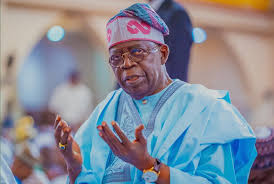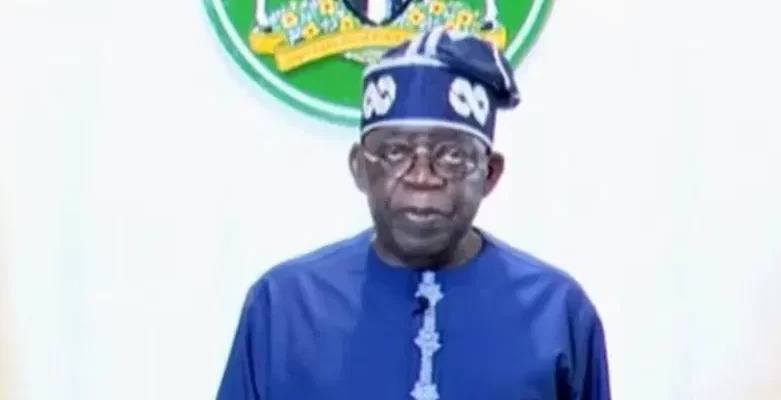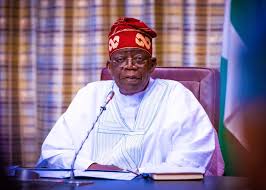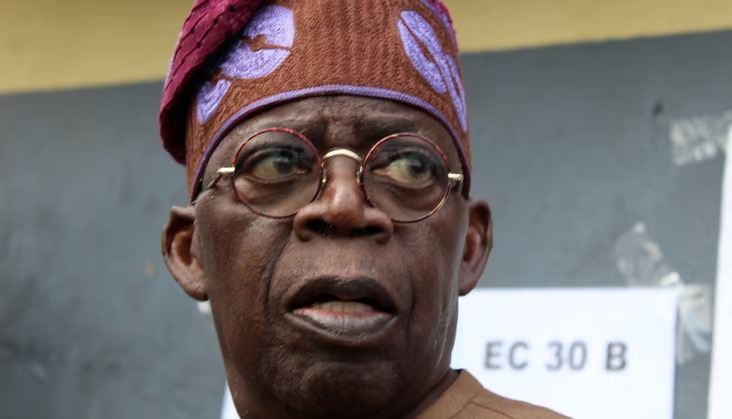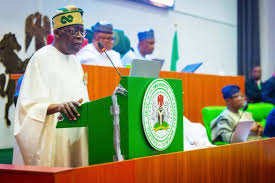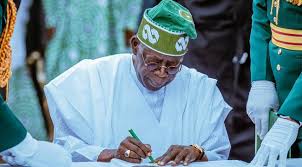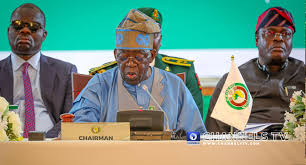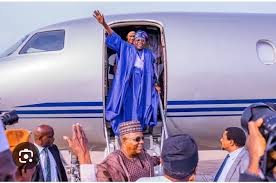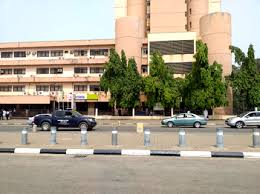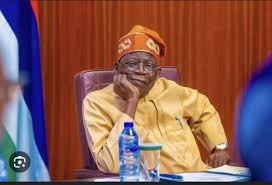ABUJA — The Federal Government has initiated moves to increase its 2025 budget to N54.2 trillion, up by 9.1 per cent from N49.7 trillion initially presented to the National Assembly on December 18, 2024.
A letter from President Bola Ahmed Tinubu to the National Assembly requesting the increase was read at plenary yesterday by the President of the Senate, Senator Godswill Akpabio. The letter was titled, “2025 Appropriation Bill: Allocation of Additional Revenue of N4.53trillion.”
According to Akpabio, the increase arose from N1.4 trillion in additional revenues from the Federal Inland Revenue Service, FIRS; N1.2 trillion made by the Nigeria Customs Service, NCS; and N1.8 trillion generated by some other government-owned agencies.
Consequently, he directed the request to the Senate Committee on Finance and Appropriations for expeditious consideration and declared that the budget consideration would be concluded and passed before the end of this month.
The letter reads: “I am writing to inform you of the availability of additional revenue amounting to N4.5 trillion and to propose its allocation within the 2025 Appropriation Bill to enhance the budget’s responsiveness to the nation’s most pressing priorities and aspirations.”
President Tinubu, who noted that the additional increase to the budget will give opportunity for government to address Nigeria’s critical challenges, said: “This additional revenue sourced from key agencies represents a pivotal opportunity to address Nigeria’s critical challenges and advance her development agenda.
‘’This additional revenue, sourced from key agencies, represents a pivotal opportunity to address Nigeria’s critical challenges and advance her development agenda: Government-Owned Enterprises (GOES): N1,823,879,970,637; Federal Inland Revenue Service, FIRS, N1,497,600,000,000; (Federal Government’s
52% share of the increase in revenue from N22.1 trillion to N25.1 trillion_
Nigerian Customs Service (NCS): N1,209,000,000,000 (Federal Government’s 52% share of the increase in revenue from N6.5 trillion to N9.0 trillion)
“With this additional revenue, the 2025 Appropriation Bill’s total budget size will increase from N49.7 trillion to N54.2 trillion, demonstrating our commitment to inclusive growth and security.
“Proposed Allocation of Additional Revenue: I propose that these funds be allocated to the following transformative expenditure areas: Solid Minerals Sector-N1 trillion.
‘’To support economic diversification by unlocking the potential of Nigeria’s vast solid mineral resources, which remain an untapped revenue stream and a vital pillar of non-oil growth.
“Recapitalization of the Bank of Agriculture (BoA) N1.5 trillion: To transform Nigeria’s agricultural landscape, ensure food security, and empower smallholder farmers and agribusinesses.
“Recapitalization of the Bank of Industry (Bol) N500 billion To provide critical support to small and medium enterprises (SMEs), drive local manufacturing, and reduce dependence on imports
“Critical Infrastructure Projects (RHID Fund) – N1.5 trillion. Allocated as follows: Irrigation Development (through River Basin Development Authorities): N380 billion.
“Transportation Infrastructure (roads and rail): N700 billion (300 billion for the construction and rehabilitation of critical roads and 400 billion for light rail network development in urban centers), Border Communities Infrastructure: N50 billion, Military Barracks Accommodation: N250 billion, and Military Aviation: N120 billion.’’
After reading the letter, the President of the Senate directed the request to the Senate Committees on Finance, chaired by Senator Sani Musa (APC, Niger East) and Appropriations, chaired by Senator Olamilekan Adeola (APC, Ogun West), for expeditious consideration.
Akpabio assured that the increase will be implemented on the 2025 budget and passed by the National Assembly before the end of February for the president’s assent.
However, in a swift reaction some financial analysts and public affairs commentators condemned the development, describing it as a major threat to macroeconomic stability, including inflation, exchange rate and fiscal deficit amongst others.
It’s in conflict with CBN’s anti-inflation policy —Adonri
Commenting on the increase in the 2025 Budget, David Adonri, Analysts and Executive Vice Chairman at Highcap Securities Limited, said: “The financial management practice of FGN does not inspire confidence. This is because of conflicts between fiscal policy and monetary policy. While fiscal policy is expansionary as exemplified by growing fiscal deficit which fuels inflation, monetary policy is contractionary to rein in inflation caused by excessive public spending amidst scarcity of goods.
“The lack of conscious effort by FGN to balance the budget to bring sanity to public finance, promote economic stability and facilitate non-inflationary growth to the economy beats my imagination. The recent increase of FGN’s budget by N4 trillion when government is still running an over-bloated budget deficit is a big threat to bringing down inflation rate to 15% this year as projected in the Appropriation Act. If FGN is earning higher revenue than projected, why not use the excess to defray the deficit?”
Increase in budget will increase size of deficits – ADEOSUN, former CIS President
former Chartered Institute of Stockbrokers (CIS) President, Oluwole Adeosun said, “I have always been an advocate for an ambitious budget because that’s the only way we can improve our grossly inadequate infrastructure before we can even contemplate gravitating towards a productive economy.
According to him, “On a per capita basis if you look at our budget we are way below that of countries with similar demographics in terms of population and age. How then do we hope to lift our people out of poverty when the government itself isn’t spending enough to raise people’s standard of living?
“It’s clear the increase in budget will increase the size of the deficit which stands at about N13 trillion at the moment. I would however like to see adjustments that might have been made to the revenue assumption in the new budget to know the quantum of increase. However, the fact that the budget increase is occasioned by increased revenue collection by various government agencies is positive,” he said.
“For me in as much as the budget is faithfully implemented and monies spent judiciously we should not have any issues .Its however important that we keep our eye on ratios such as debt to revenue and debt to GDP to ensure we do not tip into over-leveraged territory,” Adeosun concluded.
Over-estimation could widen fiscal deficit, forcing more borrowing —Egbomeade
Reacting as well, Clifford Egbomeade, Public analyst and communication expert, said: “The N4.5 trillion increase in Nigeria’s 2025 budget to N54.2 trillion is based on projected revenue gains from the FIRS (N1.4 trillion), Customs (N1.2 trillion), and other agencies (N1.8 trillion). While this suggests improved revenue collection, the real issue is whether these projections are realistic and sustainable. Historically, Nigeria has struggled with revenue underperformance, and an overestimation can widen the fiscal deficit, forcing more borrowing. If not properly managed, this could further drive up inflation and debt servicing costs, worsening economic instability.
“More spending can be beneficial if it is strategically allocated to critical sectors like infrastructure, healthcare, and job creation. However, Nigeria’s weak budget execution and corruption risks raise concerns about waste and mismanagement. Without strict oversight, this budget increase may not translate into meaningful economic growth. The National Assembly must ensure that these additional funds are backed by concrete revenue inflows and spent on projects that deliver measurable results”.
Why 2025 budget was increased to N54.2trn — FG
Explaining the reason for the increase in the budget figure, the Minister of Budget and Economic Planning, Senator Atiku Bagudu, said it was for government to have more revenue to strengthen the Bank of Agriculture, Bank of Industry and support the diversification programme by putting more money in the solid minerals sector as well as infrastructure projects.
Bagudu, who disclosed this to journalists shortly after seeing off President Bola Tinubu at the Nnamdi Azikiwe Airport, Abuja, en route France, said: “You will recall Mr President submitted 49 trillion naira budget to the National Assembly and legislative work commenced.
“The legislative work continued with interactions between the executive and the national assembly. The National Assembly and the Economic Management Team continued to interrogate all figures.
“In that process, the Senate committee on appropriation, senate committee on national planning, senate committee on finance established that we can generate more revenue by tasking all the institutions to do more and the federal inland revenue service confirmed the ability to do more than was submitted.
“Equally, it was established that government-owned enterprises can contribute more revenue, as well as the Customs Service. So additional revenue, amounting to over N4.5 trillion was established and this was taken to the President.”
On adjustment of the Medium Term Expenditure Framework, MTEF, Senator Bagudu said: “Recall that even when the budget was submitted, MTEF was amended.
“The MTEF that was initially approved was for a budget of less than N49 trillion, so it goes together and so the consequential amendment to the MTEF will certainly follow.”
Absence of detailed clarifications on income sources concerning —NACCIMA
President of Nigerian Association of Chambers of commerce, Industry, Mines and Agriculture (NACCIMA), Dele Oye, expressed misgivings over the absence of detailed clarifications on the expected additional sources of income to warrant increase in the budget.
He stated: “President Bola Tinubu’s recent appeal to the Senate for an amendment to the 2025 national budget, raising it from N49.7 trillion to N54.2 trillion, marks a noteworthy divergence from conventional budgetary process. This request, communicated mid-deliberations, prompts an examination of the ramifications and the over-arching context of increased fiscal projections.
“The request has been articulated by Senate President Godswill Akpabio, who indicated that the proposed expansion is underpinned by anticipated additional revenues from key government agencies: N1.4 trillion
from the Federal Inland Revenue Service (FIRS), N1.2 trillion from the Nigeria Customs Service, and N1.8 trillion from various government-owned entities.
“However, absence of detailed clarifications regarding these income sources raises a point of concern. Stakeholders are left to ponder the viability and reliability of these projected revenues, particularly as they play a crucial role in justifying the budgetary increment.
“Nevertheless, the aspirations tied to this additional funding, particularly regarding bolstering the Bank of Industry and Bank of Agriculture, reflect a strategic vision aimed at facilitating economic diversification and stimulating growth across critical sectors.
“The intention to channel these funds into strengthening these development banks can yield significant benefits for the productive sector and, by extension, the private sector. Enhanced financial support for these institutions is likely to promote increased investment in infrastructure, solid minerals, and various diversification programs—imperatives for a resilient economy.
“Moreover, the proposed increase necessitates subsequent amendments to the Medium-Term Expenditure Framework (MTEF), which was originally designed to accommodate a budget of less than N49 trillion. Adapting this framework to align with the revised fiscal strategy underlines the government’s ambition to elevate its economic objectives.’’
Nothing is new in Nigeria, nor will any govt. policy cause our hearts to flutter. We have passed the stage of being shocked and have girded up our loins in readiness for future hikes and, possibly, stiffer sanctions. Things are getting increasingly difficult for the poor masses, while our govt.
chooses to be ignorant or indifferent about the situation. Instead of seeking ways to ease the burden on the people they govern, their inhumane policies and bills are making life harsher and harder. At this juncture, it is only God that can help us, and I pray He sustains us till the end.
—Endurance Osibanjo,Entrepreneur
I have consistently argued that the government exhibits glaring insensitivity and disregard for the plight of the poor. Addressing poverty seems to be far from their list of priorities.
Their actions evidently widen the gap between the rich and the poor, enriching the affluent while further marginalizing the underprivileged. Instead of imposing additional burdens on the poor, students, and other vulnerable groups, why not levy contributions from companies that boast of enormous profits year after year?
—Joshua Ajewole, Publisher
It seems like it is now a crime to be a citizen or even a student in Nigeria. The Federal Government has prioritized worsening the economic hardship the nation is currently enduring. In an economy as challenging as this, where internet access is mandatory for students and the working class, the government should shoulder this burden instead of further weighing down the already weary shoulders of the public. If anything, affordability should be prioritized during such tough times.
—Eunice Omoruyi, Content Creator
The government of the day has continued to hike the prices of everything without any reasonable justification. This hike seems designed to make life more difficult for Nigerians, with the excuse being the losses incurred by telecommunications companies—a situation that is expected in a country with no reliable
electricity. At this point, I fail to see the dividend of democracy in Nigeria. The government seems to find unending joy in impoverishing the people.
—Manoah Kikekon, Journalist
Telecom companies have been struggling in recent months due to rampant inflation and as a result, many of them are unable to meet their financial obligations to investors and desperately need to raise their tariffs. However, the unfortunate reality is that any tariff hike ultimately impacts the same group of people – the consumers. These are the individuals who have not received salary increases, the customers who earn modest wages, and the buyers who bear the burden of rising costs in both public and private sectors.
—Iranitiola Olutayo, Public Relations expert
The 50% hike in telecoms tariffs will generate additional revenue for govt., which could be used to improve infrastructure and services. It could also incentivize telecom companies to invest more in network upgrades and expand coverage to underserved areas. However, it will have negative consequences. It could disproportionately impact low-income individuals and businesses, hindering access to vital communication services.
This could lead to a decline in internet usage and hinder the growth of the digital economy. It could also drive consumers toward cheaper, and less reliable alternatives, ultimately affecting the quality of services. —Romoke Olisa Adeyemi, Entrepreneur
